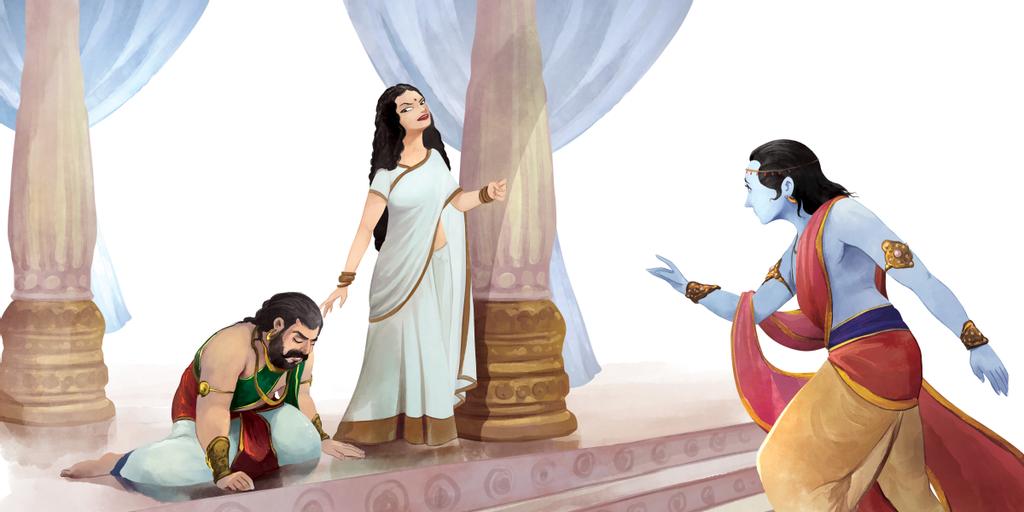Afew days later, King Dasharatha decided to anoint Rama as the Crown Prince of Ayodhya --making him the successor to the throne. He discussed his choice with Sage Vashisht and his ministers. Everyone supported his choice unanimously. King Dasharatha made the announcement, and the preparations for Rama’s coronation began in full swing.
On the day of his coronation, Queen Kaikei summoned Rama to her chambers. Rama was surprised to see his father lying on the ground, distraught with grief. He asked Queen Kaikei, “Mother, what is wrong? Why is father so sad?”
Queen Kaikei replied, “Your father promised me two boons a long time ago when I saved his life. Today, I asked for those two boons. I want my son Bharat to become the next king of Ayodhya, and I want you to go into exile for fourteen years. Your father would be unable to keep his promise without your help.”
Rama smiled and humbly bowed to Queen Kaikei. He said, “The brave warriors of the clan of Raghu can sacrifice their lives, but will never go back on their word. I will be happy if my brother, Bharat, becomes the next king of Ayodhya. I will leave for the forest immediately. My father will keep his promises to you.”
Rama took blessings from Queen Kaikei and left the chamber to meet his mother, Queen Kaushalya, and his wife, Sita.
Queen Kaushalya was devastated to hear Rama’s decision to forfeit his claim to the throne of Ayodhya and go to the forest for fourteen years. However, she did not try to convince him to reconsider his choice. When Rama shared the news with Sita, she said calmly, “I will come with you to the forest. As your wife, I will share all the hardships you face in your life.”
Rama tried to convince Sita to stay in the palace and warned her about the troubles she would have to face in the forest. When he realized that she was firm about her decision, he allowed her to accompany him. When Lakshmana found out about Rama’s exile, he rushed to meet him. He fell on Rama’s feet, and said, “I cannot bear to be separated from you, Brother. You cannot leave me behind.”
Touched by Lakshmana’s devotion, Rama said, “How can I leave without you, Lakshmana? Go and bid farewell to your mother and your wife. You can come to the forest with me.”
Happy to be near his brother, Lakshmana bade farewell to his mother and his wife, Urmila. King Dasharatha protested against Lakshmana and Sita’s decision to go to the forest along with Rama, but eventually gave up with a heavy heart. Rama, Sita, and Lakshmana left their royal robes and ornaments behind. They draped themselves in simple clothes and bade farewell to their parents.

King Dasharatha ordered one of his ministers to take Rama, Lakshmana, and Sita to the forest’s edge on a chariot. When the citizens of Ayodhya found out about Rama’s exile, they surrounded his chariot and followed behind him. Rama requested them to stay back, but they did not listen to him. At nightfall, Rama decided to stop near the banks of River Tamasa. After everyone had fallen asleep, Rama, Sita, and Lakshmana left quietly along with the minister. In the morning, the disappointed citizens of Ayodhya had to return to the city.
When Guha, the head of the Nishad tribe, heard about Rama’s arrival in his kingdom, he, with his subjects, rushed to welcome him. He served them fruits and made beds for them with kusha grass and soft leaves near the river Ganges. Rama thanked Guha for his hospitality.
The next day Rama, Lakshmana, and Sita took leave of the minister and asked him to return to Ayodhya. Rama approached a boatman and requested that he carry them across the river Ganges. The boatman replied, “My name is Kewat. I have heard that the dust from your feet turned a rock into a woman. This boat is my only source of income. What will happen to me if my boat turns into a woman? I can take you across only if you allow me to wash your feet first.”
Rama smiled at the strange request, but agreed. After washing Rama’s feet, Kewat transported him, Lakshmana, and Sita across the Ganges.


